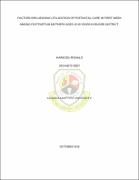Factors influencing utilization of postnatal care in first week among postpartum mothers aged 15-49 years in Bugiri District.
Abstract
Background: High maternal and infant deaths occur within the first 24 hours to during the first week after birth which is a critical time for both the mother and newborn. Although utilization of early postnatal care prevents the great majority of maternal and infant morbidity and mortality, the period is largely the most neglected in most of the developing countries. Knowledge on the determinants of postnatal care assists the policy makers to design, justify and implement appropriate interventions.
Study Objective: The aim of the study was to determine the factors associated with utilization of postnatal care in the first week after delivery among postpartum mothers in Bugiri district.
Methods: The study used community based cross sectional study design. Sample size was determined using Kish Leslie formula of 1965. Multi-stage random sampling technique was used and data was collected using structured questionnaires, key informants interview and observation checklist. Data was cleaned and entered into SPSS version 20 for statistical analysis at 95% Confidence Interval. Chi-square (χ2) test was used to analyze relationship between dependent and independent variables. Statistical associations with probability values of less than 0.005 were considered statistically significant for logistic regression analysis into odds ratios (ORs) with subsequent 95% Confidence Interval (CI). On the other hand, qualitative data was organized into themes using ATLAS ti for analysis and observation checklist data was quantified into frequencies and percentages.
Results: The study found than more than half (59.9%) of the respondents had their first PNC after a seven days after delivery. On the other hand, less than half (40.1%) utilized PNC in the first week after delivery. Occupation (p=<0.001), participation in community activities, (p=0.001), post-delivery follow ups (p=0.001), education about PNC schedules (p=0.005), knowledge on timing of PNC (p<0.001) and waiting time (p=0.048) were significantly influencing utilization of PNC in the first week. Multivariable logistic regression analyses revealed that post-delivery follow ups of postpartum mothers significantly influenced use of PNC in the first week by42% (AOR=0.42, 95%CI=0.214-0.828, p=0.012). Postpartum mothers educated about the PNC attendance during ANC visits were 2.05 times likely to utilize PNC in the first week after delivery compared to those who were not informed (AOR= 2.05, 95%CI=1.048-4.024, p=0.036). Postpartum mothers who mentioned PNC attendance timing within 24 hours to 7 days were 3.36 times likely to utilize PNC in the first week compared to those who mentioned that early postnatal period ranges from 7 days and beyond/42 days after delivery (AOR=3.36, 1.705-6.60, p<0.001).
Conclusion: Utilization of postnatal care in the first week after birth was low, at less than half 40.1%. Utilization of postnatal care in the first week requires encouraging and educating women on necessities of attending PNC in the first week irrespective of place of delivery, conduct follow ups for postpartum mothers after delivery.


